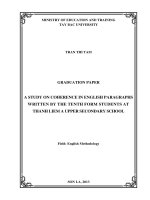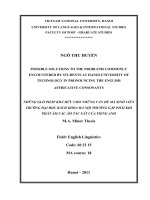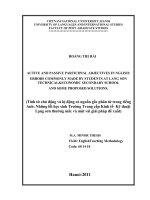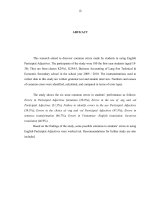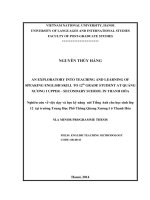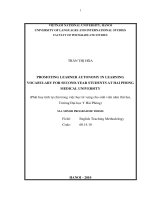Active and passive participial adjectives in English Errors commonly made by students at Lang Son technical & economic secondary school tính từ chủ động có ngu
Bạn đang xem bản rút gọn của tài liệu. Xem và tải ngay bản đầy đủ của tài liệu tại đây (1.06 MB, 13 trang )
VIETNAM NATIONAL UNNIVERSITY, HANOI
UNIVERSITY OF LANGUAGES AND INTERNATIONAL STUDIES
FACULTY OF POST -GRADUATE STUDIES
****************************************
HOÀNG THỊ HẢI
ACTIVE AND PASSIVE PARTICIPIAL ADJECTIVES IN NGLISH:
ERRORS COMMONLY MADE BY STUDENTS AT LANG SON
TECHNICAL&ECONOMIC SECONDARY SCHOOL
AND SOME PROPOSED SOLUTIONS.
(Tính từ chủ động và bị động có nguồn gốc phân từ trong tiếng
Anh: Những lỗi học sinh Trường Trung cấp Kinh tế- Kỹ thuật
Lạng sơn thường mắc và một vài giải pháp đề xuất)
M.A. MINOR THESIS
Field: EnglishTeaching Methodology
Code: 60 14 10
Hanoi-2011
VIETNAM NATIONAL UNNIVERSITY, HANOI
UNIVERSITY OF LANGUAGES AND INTERNATIONAL STUDIES
FACULTY OF POST -GRADUATE STUDIES
****************************************
HOÀNG THỊ HẢI
ACTIVE AND PASSIVE PARTICIPIAL ADJECTIVES IN NGLISH:
ERRORS COMMONLY MADE BY STUDENTS AT LANG SON
TECHNICAL&ECONOMIC SECONDARY SCHOOL
AND SOME PROPOSED SOLUTIONS.
(Tính từ chủ động và bị động có nguồn gốc phân từ trong
tiếng Anh: Những lỗi học sinh Trường Trung cấp Kinh tế-
Kỹ thuật Lạng sơn thường mắc và một vài giải pháp đề xuất)
M.A. MINOR THESIS
Field: EnglishTeaching Methodology
Code: 60 14 10
SUPERVISOR: Assoc. Prof. Dr. VÕ ĐẠI QUANG
Hanoi-2011
iii
ABSTrACT
This research aimed to discover common errors made by students in using English
Participial Adjectives. The participants of the study were 100 the first-year students (aged 18-
30). They are from classes K29A1, K29A5, Business Accounting of Lang Son Technical &
Economic Secondary school in the school year 2009 / 2010. The instrumentations used to
collect data in this study are written grammar test and student interview. Numbers and causes
of common errors were identified, calculated, and compared in terms of error types.
The study shows the six most common errors in students’ performance as follows:
Errors in Participial Adjectives formation (29.4%); Errors in the use of -ing and -ed
Participial Adjectives (31.3%); Failure to identify errors in the use Participial Adjectives
(39.5%); Errors in the choice of -ing and -ed Participial Adjectives (47.5%); Errors in
sentence transformation (46.7%); Errors in Vietnamese -English translation: Incorrect
translation (46.9%)
Based on the findings of the study, some possible solutions to students’ errors in using
English Participial Adjectives were worked out. Recommendations for further study are also
included.
iv
LIST OF ABBREVIATIONS AND SYMBOLS
E.g.
For example
E.P.Adjs
English Participial Adjectives
P.Adjs
Participial Adjectives
S V C
Subject + Verb + complement
S V O C
Subject + Verb + Object + complement
L1
First language
L2
Second language
v
LIST OF TABLES AND FIGURES
Table 3.1
Table 3.2
Table 3.3
Table 3.4
Table 3.5
Table 3.6
Figure 3.1
Figure 3.2
Figure 3. 3
Figure 3.4:
Figure 3.5
Figure 3.6
Errors in word formation (p.24)
Errors in the use of -ing and -ed P.Adjs. (p.26)
Failure to identify the wrong use of -ing and -ed P.Adjs (p.270
Incorrect choice of -ing and -ed P.Adjs (p.29)
Errors in sentence transformation (p.30)
Errors in Vietnamese -English translation (p.320
Difference between two groups of students in giving wrong answers to
exercise 1 (p.25)
Difference between two groups of students in giving wrong answer to
exercise 2 (p.27)
Difference between two groups of students in failing to identify the wrong
use of -ing and -ed P.Adjs in exercise 3 (p.28)
Difference in perceiving and (differentiating -ing P.Adjs from -ed Adjs of
students of group 1 and group 2. (p.31)
Difference between two groups of students in giving wrong answers to
exercise 5 (p.31)
Difference between two groups of students in giving wrong answers to
exercise 6 (p.33)
vi
GLOSSARY OF LINGUISTIC TERMS
Code
The systems (grammar, meaning and sound) of a language.
Error
A systematic deviation from the accepted code.
Global error
An error which affects the meaning of the whole sentence.
Local error
An error which only affects the meaning of the clause in which it is
found.
L1 transfer
Use of what the learner knows about his first language to try and
assist expression in the target language.
Interference
from L1
The effects of ‘habit’ formed in the speaker’s first language acting
upon the target language. (This is the phenomenon of borrowing
and transferring learner’s native language patterns into the target
language).
Target language
The language which the learner is learning.
Over-
generalisation
A failure by the learner to apply restrictions where appropriate to
the application of a rule. (It is learners’ previous mother tongue
experience that is considered as a means of organizing the second
language data.)
L1
First language (usually the mother tongue).
Ignorance of
rule restrictions
The second language learners “fail to observe the restrictions of
existing structures’’.
Intralingual
errors
are those which reflect the general characteristics of rule learning.
Developmental
errors
are those which illustrate the learner’s attempting to build
hypotheses about English language from his limited related
experience.
vii
TABLE OF CONTENTS
Declaration p.i
Acknowledgements ii
Abstract iii
List of abbreviations iv
List of tables and figures v
Glossary of linguistic terms vi
Table of contents vii
PART A: INTRODUCTION
1. Rationale of the study
2. Aims and objectives of the study
2.1. Aims of the study
2.2. Objectives of the study
3. Scope of the study
4. Significance of the study
5. Organization of the thesis
PART B: DEVELOPMENT
Chapter 1: Literature Review
1.1. An investigation into English Participial Adjectives
1.1.1. The formation of the Participial Adjectives
1.1.1.1. The definition of the participles
1.1.1.2. Participial Adjectives
1.1.2 Syntactic functions of Participial Adjectives
1.1.2.1. Attributive
1.1.2.2. Predicative
1.1.3. Semantic features of Participial Adjectives
1.1.3.1. Stative / Dynamic
1
1
1
1
1
2
2
2
3
3
3
3
3
3
6
6
7
9
9
viii
1.1.3.2. Gradable
1.1.4. Participial Adjectives in collocation with nouns
1.2. The meaning of Participial Adjectives compared with their Vietnamese equivalents
1.2.1. The meaning of Participial Adjectives rendered into Vietnamese
1.2.2. The choice of -ing and -ed Participial Adjectives in English
1.3. Error and Error Analysis
1.3.1. What is “error”?
1.3.2. What is “error analysis”?
1.3.3. Classification of errors
1.3.4. Possible causes of errors in second language learning
1.3.4.1. Overgeneralization in learning and using E.P.Adjs
1.3.4.2. Developmental errors
1.3.4.3. Teaching - induced errors
1.3.4.4. Language transfer
1.4. Summary
Chapter 2: Research Methodology
2.1. The context of the study
2. Participants and their background
2.3. Research method
2.3.1. Research questions
2.3.2. Instrumentation
2.3.2.1. Test
2.3.2.2. Interview
2.2.4. Data collection procedures
2.2.4.1. Data collection
2.2.4.2. Techniques of analysis
2.3. Summary
10
11
13
13
13
14
15
15
15
15
17
17
17
18
18
19
20
20
20
21
21
22
22
22
22
23
23
ix
Chapter 3: The Study
3.1. Some actual errors that students at Lang Son Technical & Economic Secondary
school commit when using E.P.Adjs
3.1.1. Errors in Participial Adjectives formation
3.1.2. Errors in the use of -ing and -ed Participial Adjectives
3.1.3. Failure to identify errors in the use Participial Adjectives
3.1.4. Errors in the choice of -ing and -ed Participial Adjectives
3.1.5. Errors in sentence transformation
3.1.6. Errors in Vietnamese -English translation
3.2 Findings and Discussion
3.3. Summary
Chapter 4: Possible solutions to the students’ errors in
using English Participial Adjectives
4.1. Possible solutions to the errors commonly made by students at Lang Son Technical
&Economic Secondary school
4.2. Suggestions for teaching and learning Participial Adjectives in English
4.2.1. Suggestions for teaching
4.2.2. Suggestions for learning
4.3. Summary
PART C: CONCLUSION
1. Conclusion
2. Recommendations for further research
References
Appendices
Appendix 1: Written grammar test
Appendix 2: Answer key
24
24
25
27
28
30
31
33
35
36
36
36
36
38
39
40
41
I
I
IV
BẢN TOÁT YẾU LUẬN VĂN
Tên luân văn: “Active and Passive Participial Adjectives in English: Errors
commonly made by students at Lang Son Technical & Economic Secondary school
and some proposed solutions.”
(Tính từ chủ động và bị động có nguồn gốc phân từ trong tiếng Anh:
Những lỗi học sinh Trường Trung cấp Kinh tế- Kỹ thuật Lạng sơn
thường mắc và một vài giải pháp đề xuất)
Người thực hiện: Hoàng Thị Hải: Cao học K18A dự án phát triển giáo viên
Người hướng dẫn: PGS.TS Võ Đại Quang
This research aimed to discover common errors made by students in
using English Participial Adjectives. The participants of the study were 100
the first-year students (aged 18-30). They are from classes K29A1, K29A5,
Business Accounting of Lang Son Technical & Economic Secondary school
in the school year 2009 / 2010. The instrumentations used to collect data in
this study are written grammar test and student interview. Numbers and
causes of common errors were identified, calculated, and compared in terms
of error types.
The study shows the six most common errors in students’ performance
as follows: Errors in Participial Adjectives formation (29.4%); Errors in the
use of -ing and -ed Participial Adjectives (31.3%); Failure to identify errors
in the use Participial Adjectives (39.5%); Errors in the choice of -ing and -ed
Participial Adjectives (47.5%); Errors in sentence transformation (46.7%);
Errors in Vietnamese -English translation: Incorrect translation (46.9%)
Based on the findings of the study, some possible solutions to students’
errors in using English Participial Adjectives were worked out.
Recommendations for further study are also included.
Nghiên cứu này nhằm mục đích tìm ra những lỗi thông thường mà học
sinh thường mắc trong quá trình sử dụng tính động từ có nguồn gốc phân từ
trong tiếng Anh. Nghiên cứu này được khảo sát trên 100 học sinh năm thứ
nhất ( tuổi từ 18-30) lớp K29 A1 và K29A5 chuyên ngành kế toán doanh
nghiệp tại trường Trung Cấp Kinh tế - Kỹ thuật Lạng Sơn năm học 2009-
2010) Công cụ dung để nghiên cứu là thu thập dữ liệu từ phiếu điều tra từ bài
kiểm tra viết ngữ pháp và phỏng vấn học sinh. Nghiên cứu này đã xác định
được, tính toán và so sánh một số loại lỗi, con số, và nguyên nhân gây ra
những lỗi thông thường đó.
Nghiên cứu này chỉ ra sáu lỗi học sinh thường mắc trong quá trình học
như sau: Lỗi trong thành lập tính từ có nguồn gốc phân từ (29.4%); Lỗi trong
sử dụng tính động từ có đuôi ing và ed ( 31.3 %); Không xác định đựoc lỗi
tính động từ ( 39.5%); lỗi trong lựa chọn tính từ có đuôi ing và ed ( 47.5%);
Lỗi trong chuyển câu ( 46.7%); lỗi trong khi dịch từ tiếng Việt sang tiếng Anh
(46.9%).
Dựa vào kết quả nghiên cứu tác giả đã gợi ý được một số đề xuất giải
pháp về lỗi của học sinh trong khi sử dụng tính động từ có nguồn gốc phân từ
trong tiếng Anh và đưa ra một số khuyến nghị cho nghiên cứu tiếp theo.
PDF Merger
Thank you for evaluating AnyBizSoft PDF
Merger! To remove this page, please
register your program!
Go to Purchase Now>>
Merge multiple PDF files into one
Select page range of PDF to merge
Select specific page(s) to merge
Extract page(s) from different PDF
files and merge into one
AnyBizSoft

